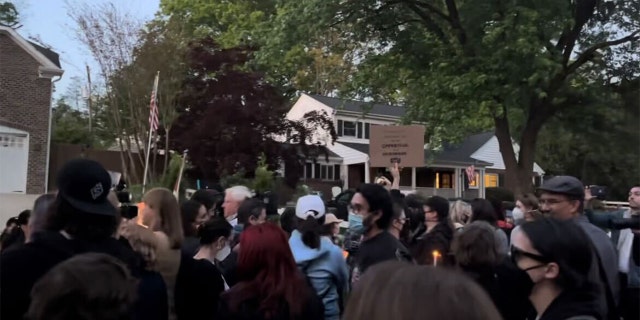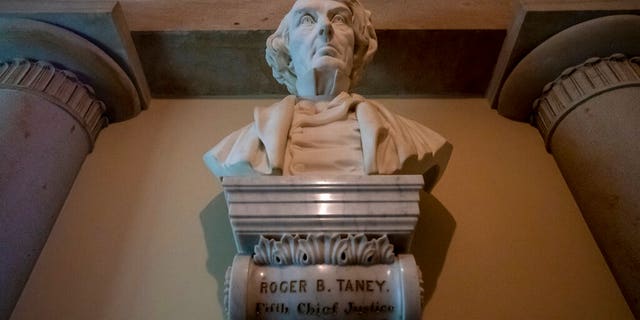In the wake of protests at Supreme Court justices’ homes over the prospect of abortion regulation and restrictions potentially being returned to state governments, former Reagan Justice Department chief of staff Mark Levin said the high court is not infallible in its landmark rulings.
Levin and former Whitewater Independent Counsel Kenneth Starr discussed past cases where the Supreme Court made a landmark ruling that was either overturned or deeply flawed.
Starr answered in the negative each time Levin brought up whether “stare decisis” from each case was sound law.

Protesters at the home of Supreme Court Justice Samuel Alito
(Fox News)
The “Life, Liberty & Levin” host first cited the 1857 suit Dred Scott v. Sandford, in which the enslaved Scott unsuccessfully sued for his emancipation after his Missouri-resident owners temporarily brought him north into Illinois and Wisconsin, where slavery was banned.
Chief Justice Roger Taney, an Andrew Jackson appointee, wrote for the majority that African-Americans “were not intended to be included under the word ‘citizens’ in the Constitution.”
LEVIN REJOINS TWITTER, BLASTS MUSK CRITICS

A marble bust of Chief Justice Roger Taney is displayed in the Old Supreme Court Chamber in the U.S. Capitol in Washington. (AP Photo/J. Scott Applewhite, File)
Outcry over the decision – later overturned by the 14th Amendment – regionally divided the Democratic Party while bolstering the ranks of the abolitionist Republican Party in the 1860 elections.
Later, Levin and Starr similarly discussed the merits of the 1944 Korematsu v. United States decision. Both agreed that it wasn’t.
In that case, a Japanese-American man named Fred Korematsu elected to remain in San Leandro, Calif., rather than relocating to the camps outlined in President Franklin Roosevelt’s executive order, which were set up during World War II when Japan and Germany were chief opponents to the U.S.
Justice Hugo Black, a Roosevelt appointee, wrote for the majority that “compulsory exclusion of large groups of citizens… except under circumstances of direct emergency and peril… is inconsistent with our basic governmental institutions – But when under conditions of modern warfare our shores are threatened by hostile forces, the power to protect must be commensurate with the threatened danger.”
CLICK TO GET THE FOX NEWS APP

Ken Starr (Fox)
In 1988, Congress paid restitution to survivors of the internment camps, and later President Clinton awarded Korematsu the Presidential Medal of Freedom.
On “Life, Liberty & Levin,” Starr said the pair of cases were “infamous decisions” that took a “long time to correct.”
He noted in relation to the abortion controversy, Justice Samuel Alito’s leaked draft decision reportedly cites “some 25 cases” wherein the court overruled its prior precedents.
“So the court has a duty to get it right and to overrule that which it believes is wrong,” he said.








